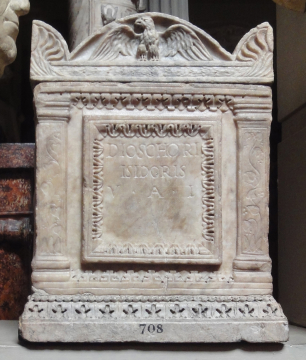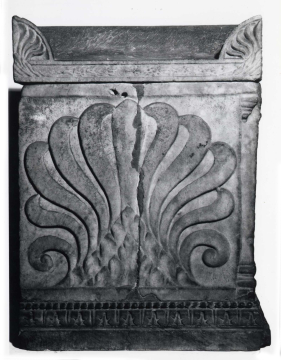Explore Collections


You are here:
CollectionsOnline
/
Roman cinerarium and lid: between double fillet and compressed waterleaf mouldings is a large name plate with similar borders flanked by two enriched Tuscan pilasters. The lid has a curved pediment ornamented with an eagle with wings half spread and an antefix on each of the four corners with enriched borders below on three sides. There are large palmettes carved on the ends / sides of the cinerarium.
Browse
Roman cinerarium and lid: between double fillet and compressed waterleaf mouldings is a large name plate with similar borders flanked by two enriched Tuscan pilasters. The lid has a curved pediment ornamented with an eagle with wings half spread and an antefix on each of the four corners with enriched borders below on three sides. There are large palmettes carved on the ends / sides of the cinerarium.
Pentelic marble
Height: 37cm
Height (excluding lid): 29cm
Width (lid): 28cm
Length (lid): 27cm
Height (excluding lid): 29cm
Width (lid): 28cm
Length (lid): 27cm
Inscription: DIOSCHORI / ISIDORIS / V. A. Ḷ
Dioschori Isidoris v[ixit]a[nnis] L
Inscription marks: Letter heights: Line 1: 15mm; Lines 2-3 14mm
Inscription note: Line 3: Both CIL and Vermeule read I at the end of line 3; however, closer examination of both the stone and the squeeze reveals an L.
This inscription is believed by CIL to be modern, based on an ancient prototype: “Titulus potest esse novicius, expressus tamen ad exemplum antiquum.”
We are grateful to Dr. Charlotte Tupman, a scholar of epigraphy (the study of inscriptions) undertaking postdoctoral research at King’s College London, who took squeezes of the inscriptions on antiquities in the Museum in 2007, for her transliteration, translation and notes/bibliography of the inscription on this piece.
Inscription translation: To Dioschorus Isidorus, who lived fifty years.
Dioschori Isidoris v[ixit]a[nnis] L
Inscription marks: Letter heights: Line 1: 15mm; Lines 2-3 14mm
Inscription note: Line 3: Both CIL and Vermeule read I at the end of line 3; however, closer examination of both the stone and the squeeze reveals an L.
This inscription is believed by CIL to be modern, based on an ancient prototype: “Titulus potest esse novicius, expressus tamen ad exemplum antiquum.”
We are grateful to Dr. Charlotte Tupman, a scholar of epigraphy (the study of inscriptions) undertaking postdoctoral research at King’s College London, who took squeezes of the inscriptions on antiquities in the Museum in 2007, for her transliteration, translation and notes/bibliography of the inscription on this piece.
Inscription translation: To Dioschorus Isidorus, who lived fifty years.
Museum number: M708
On display: Dome Area
All spaces are in No. 13 Lincoln's Inn Fields unless identified as in No. 12, Soane's first house.
For tours https://www.soane.org/your-visit
Curatorial note
Inscribed:
DIOSCHORI
ISIDORIS
V·A·I
The inscription here is questioned in C.I.L.; an antique prototype, however, is acknowledged.
The lid, even though ancient is likely to be from a different urn and cut to the correct size. As bases to urns were rarely, or as Sinn states, 'never', ancient, the base is a later 'restoration' as well. Professor Glenys Davies (correspondence in SM object file) considers this urn to be possibly from the Piranesi workshop based on a comparative study of the patterns used on the bases of urns known to have passed through Piranesi's hands. It is possible that Piranesi added a base to heighten the decorative effect.
DIOSCHORI
ISIDORIS
V·A·I
The inscription here is questioned in C.I.L.; an antique prototype, however, is acknowledged.
The lid, even though ancient is likely to be from a different urn and cut to the correct size. As bases to urns were rarely, or as Sinn states, 'never', ancient, the base is a later 'restoration' as well. Professor Glenys Davies (correspondence in SM object file) considers this urn to be possibly from the Piranesi workshop based on a comparative study of the patterns used on the bases of urns known to have passed through Piranesi's hands. It is possible that Piranesi added a base to heighten the decorative effect.
Unrecorded.
Literature
Corpus Inscriptionum Latinarum (CIL), VI, iii, 16894.
F. Sinn, Stadtrómische Marmorurnen, Mainz, 1987, p.270.
H. Solin, Die Griechischen Personennamen im Rom. Ein Namenbuch, 2003, p. 511.
F. Sinn, Stadtrómische Marmorurnen, Mainz, 1987, p.270.
H. Solin, Die Griechischen Personennamen im Rom. Ein Namenbuch, 2003, p. 511.
Soane collections online is being continually updated. If you wish to find out more or if you have any further information about this object please contact us: worksofart@soane.org.uk





